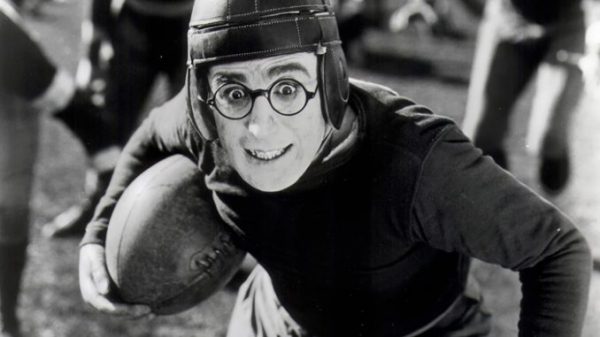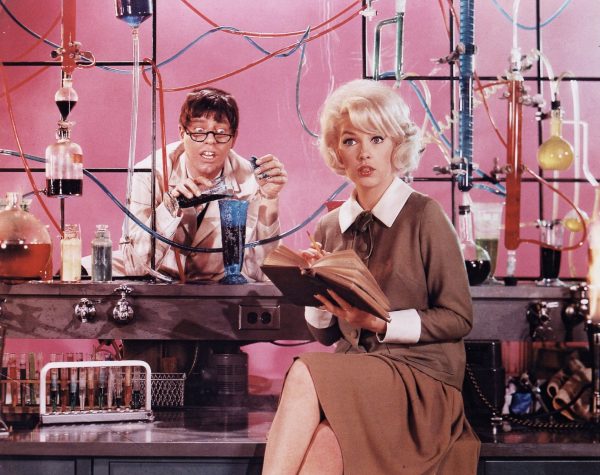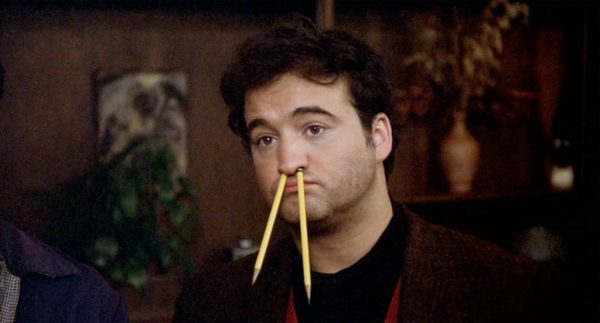Film Review: More Movies to Watch While Sheltering in Place — Campus Best, Pre-Pre-Covid
By Gerald Peary
A dozen feature films — none made less than 35 years ago — that best capture the American campus experience and spirit.
It’s that time of year again: starting college, returning to college, but maybe, Fall 2020, only virtually. Whatever. Think pre-pre-Covid. Here are my picks of the top 12 films of the past — none made less than 35 years ago — that best capture the American campus experience and spirit.

Harold Lloyd is pulled off the bench for the big football game in The Freshman.
The Freshman (1925) — Bespectacled Harold Lloyd goes off to school, desperate to be popular, in this silent masterpiece. It’s as side-splittingly funny as it is sweet and charming, whether Lloyd is practicing his goofy, patented handshake to make instant friends or running wild in an uproarious football game.
The Wild Party (1929) — The first talkie from the effervescent “It” girl, Clara Bow, takes place in a girl’s college, where flapper Clara majors in Jazz Age hoofing. Her educational attitude shapes up when she becomes enamored of a new, serious teacher (Fredric March). Dorothy Arzner was the only woman directing in Hollywood from 1927 to 1943. The tight, sensual relationship of the female students reveals Arzner’s shadowy lesbian subtext.
Horse Feathers (1934) — A loopy, anarchic Marx Brothers extravaganza in which Groucho is appointed the new president of Huxley College. He plots to save the sinking U by importing ringer footballers. Instead of behemoth athletes, he gets Harpo and Chico, and the rest is delirious insanity, including Groucho’s hilarious wooing of the campus widow. The fourth Marx brother, Zeppo, plays Groucho’s idiot son, in his 12th year as a Huxley undergrad.
Good News (1937) — Here it is: “College: the Musical,” a peppy MGM remake of an 1930 song-and-dance film about innocent, pie-eyed 1920s campus life. The librarian (June Allyson) falls for the football hero (Peter Lawford), and the predictable on-again-off-again romance–there’s a vamp in the way of their love!—is surrounded by a classy score including “The Varsity Drag” and “The Best Things in Life Are Free.”
The Male Animal (1942) — An unusual college comedy of ideas, from a Broadway play by humorist James Thurber. An English teacher at a football-mad Midwestern university (Thurber attended Ohio State) reads to his class a death-house letter from Bartolomeo Vanzetti. Afterward, the conservative trustees wish to fire him as a Communist. The teacher’s line of defense, brave for timid Hollywood, is standing strong for the First Amendment and freedom of speech.

Jerry Lewis and Stella Stevens in The Nutty Professor.
The Nutty Professor (1963) — The French adore this Jerry Lewis starring-and-directed movie. Therein, Lewis plays a clumsy, introverted, bucktoothed science teacher who, after gulping down a magic formula, transforms into a vainglorious lounge singer. The movie is funny and clever, as Lewis slides deliciously between the two parts of himself. One caveat: in #MeToo days, who can look lightly on the fact that the good professor is nutty about one of his female students?
Love Story (1970) — Yes, it’s cheesy and disease-of-the-week, and yet there is something undeniably touching about this ill-fated romance of a Harvard blueblood (Ryan O’Neal) and a working-class Radcliffe coed (Ali McGraw). Get past the nonsense adage, “Love means never having to say you’re sorry,” and check out the halcyon Cambridge and Harvard settings, from the times before film crews were banned from shooting on the campus.
The Paper Chase (1973) — The most infamous professor in all of cinema is John Houseman’s tweedy, imperious, insulting Harvard Law professor. Will he win a battle of wills with a stubborn first-year student (Timothy Bottoms), who is also in a love affair with the professor’s prized daughter? More important, will the student be co-opted by the patrician, establishment values of the Ivy world?
The Way We Were (1973) — It’s only the first section of Arthur Laurents’s screenplay that takes place at a university, but what a unique Act One to slip into a mainstream Hollywood movie. Barbra Streisand’s Katy is taken seriously as a Jewish campus activist and Robert Redford’s Hubbell, in a classroom scene, is treated with respect when he reads aloud his composition, a literary-minded short story.

John Belushi cutting up in National Lampoon’s Animal House.
National Lampoon’s Animal House (1978) — If you’re going to be politically noxious and flagrantly incorrect, then do it with audacious style and flair, and bring in John Belushi. Filmmaker John Landis charms even the most priggish into chortling along with the outrageous antics of a devilish Greek house, as the amoral frat boys are raised to the level of rakish wits in a Restoration comedy.
Revenge of the Nerds (1983) — A savvy rebuttal to Animal House, this pro-nerd feature seemed radical when made, in an age before Comic-Cons and new-media geeks were ascendant. It’s still a hoot to watch the outcast computer science majors, in an alliance with a dorky woman, an Asian, a gay man, and a black fraternity, foil the odious white-boy Greeks.
The Sure Thing (1985) — Rob Reiner’s beloved road trip comedy puts quarreling students John Cusack and Daphne Zuniga on the highway, but their estrangement ends, to our satisfaction, with true love back at the university. The deus ex machina is provided by a capable, caring professor, played with aplomb by Viveca Lindfors.
Gerald Peary is a Professor Emeritus at Suffolk University, Boston, curator of the Boston University Cinematheque, and the general editor of the “Conversations with Filmmakers” series from the University Press of Mississippi. A critic for the late Boston Phoenix, he is the author of nine books on cinema, writer-director of the documentaries For the Love of Movies: the Story of American Film Criticism and Archie’s Betty, and a featured actor in the 2013 independent narrative Computer Chess. His new feature documentary, The Rabbi Goes West, co-directed by Amy Geller, is playing at film festivals around the world.

I would add Buster Keaton’s College (1927) to this list. One of his lesser known silents, it is the tale of bookworm who tries to win a girl by becoming an athlete. The catch is that Keaton’s natural abilities — his amazing physical process — are evident from the get-go. But so what? The climax has Keaton winning some sort of super competition in order to save his lady love from the clutches of a campus Lothario. Not in the same masterpiece league as Keaton’s previous film, The General, but it is still highly enjoyable.